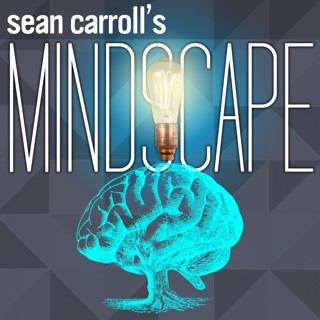
19 | Tyler Cowen on Maximizing Growth and Thinking for the Future
Economics, like other sciences (social and otherwise), is about what the world does; but it's natural for economists to occasionally wander out into the question of what we should do as we live in the world. A very good example of this is a new book by economist Tyler Cowen, Stubborn Attachments. Tyler will be well-known to many listeners for his long-running blog Marginal Revolution (co-created with his colleague Alex Tabarrok) and his many books and articles. Here he offers a surprising new take on how society should arrange itself, based on the simple idea that the welfare of future generations counts for just as much as the welfare of the current one. From that starting point, Tyler concludes that the most moral thing for us to do is to work to maximize economic growth right now, as that's the best way to ensure that future generations are well-off. We talk about this idea, as well as the more general idea of how to think like an economist. (In the second half of the podcast we veer off into talking about quantum mechanics and the multiverse, to everyone's benefit.) Tyler Cowen is the Holbert C. Harris professor of economics and General Director of the Mercatus Center at George Mason University. He is the author of over a dozen books and many journal articles, and writes frequently for the popular press. His blog Marginal Revolution is one of the leading economics blogs on the internet. He is widely recognized for his eclectic interests, from chess to music to ethnic dining. Website Home page at George Mason Mercatus Center web page Marginal Revolution Marginal Revolution University Twitter Bloomberg Opinion columns Tyler Cowen's Ethnic Dining Guide Wikipedia page Amazon books See Privacy Policy at https://art19.com/privacy and California Privacy Notice at https://art19.com/privacy#do-not-sell-my-info.
22 Okt 201859min

18 | Clifford Johnson on What's So Great About Superstring Theory
String theory is a speculative and highly technical proposal for uniting the known forces of nature, including gravity, under a single quantum-mechanical framework. This doesn't seem like a recipe for creating a lightning rod of controversy, but somehow string theory has become just that. To get to the bottom of why anyone (indeed, a substantial majority of experts in the field) would think that replacing particles with little loops of string was a promising way forward for theoretical physics, I spoke with expert string theorist Clifford Johnson. We talk about the road string theory has taken from a tentative proposal dealing with the strong interactions, through a number of revolutions, to the point it's at today. Also, where all those extra dimensions might have gone. At the end we touch on Clifford's latest project, a graphic novel that he wrote and illustrated about how science is done. Clifford Johnson is a Professor of Physics at the University of Southern California. He received his Ph.D. in mathematics and physics from the University of Southampton. His research area is theoretical physics, focusing on string theory and quantum field theory. He was awarded the Maxwell Medal from the Institute of Physics. Johnson is the author of the technical monograph D-Branes, as well as the graphic novel The Dialogues. Home page Wikipedia page Publications A talk on The Dialogues Asymptotia blog Twitter See Privacy Policy at https://art19.com/privacy and California Privacy Notice at https://art19.com/privacy#do-not-sell-my-info.
15 Okt 20181h 12min

17 | Annalee Newitz on Science, Fiction, Economics, and Neurosis
The job of science fiction isn't to predict the future; it's to tell interesting stories in an imaginative setting, exploring the implications of different ways the world could be different from our actual one. Annalee Newitz has carved out a unique career as a writer and thinker, founding the visionary blog io9 and publishing nonfiction in a number of formats, and is now putting her imagination to work in the realm of fiction. Her recent novel, Autonomous, examines a future in which the right to work is not automatic, rogue drug pirates synthesize compounds to undercut Big Pharma, and sentient robots discover their sexuality. We talk about how science fiction needs more economics, how much of human behavior comes down to dealing with our neuroses, and what it's like to make the transition from writing non-fiction to fiction. Annalee Newitz is currently an Editor at Large at Ars Technica. She received her Ph.D. in English and American Studies from UC Berkeley. She founded and edited io9, which later merged with Gizmodo, where she also served as editor. She and Charlie Jane Anders host the podcast Our Opinions Are Correct, a bi-weekly exploration of the meaning of science fiction. Home page Wikipedia page Amazon author page Articles at io9/Gizmodo Articles at Ars Technica Our Opinions Are Correct podcast See Privacy Policy at https://art19.com/privacy and California Privacy Notice at https://art19.com/privacy#do-not-sell-my-info.
8 Okt 20181h 11min

16 | Coleen Murphy on Aging, Biology, and the Future
Aging -- everybody does it, very few people actually do something about it. Coleen Murphy is an exception. In her laboratory at Princeton, she and her team study aging in the famous C. Elegans roundworm, with an eye to extending its lifespan as well as figuring out exactly what processes take place when we age. In this episode we contemplate what scientists have learned about aging, and the prospects for ameliorating its effects -- or curing it altogether? -- even in human beings. Coleen Murphy received her Ph.D. in biochemistry from Stanford University, and is currently Professor in the Department of Molecular Biology and the Lewis-Sigler Institute of Integrative Genomics at Princeton. Home page at the Lewis-Sigler Institute Lab web page Princeton Profile Google Scholar publication page Twitter See Privacy Policy at https://art19.com/privacy and California Privacy Notice at https://art19.com/privacy#do-not-sell-my-info.
1 Okt 20181h 4min

15 | David Poeppel on Thought, Language, and How to Understand the Brain
Language comes naturally to us, but is also deeply mysterious. On the one hand, it manifests as a collection of sounds or marks on paper. On the other hand, it also conveys meaning – words and sentences refer to states of affairs in the outside world, or to much more abstract concepts. How do words and meaning come together in the brain? David Poeppel is a leading neuroscientist who works in many areas, with a focus on the relationship between language and thought. We talk about cutting-edge ideas in the science and philosophy of language, and how researchers have just recently climbed out from under a nineteenth-century paradigm for understanding how all this works. David Poeppel is a Professor of Psychology and Neural Science at NYU, as well as the Director of the Max Planck Institute for Empirical Aesthetics in Frankfurt, Germany. He received his Ph.D. in cognitive science from MIT. He is a Fellow of the American Association of Arts and Sciences, and was awarded the DaimlerChrysler Berlin Prize in 2004. He is the author, with Greg Hickok, of the dual-stream model of language processing. See Privacy Policy at https://art19.com/privacy and California Privacy Notice at https://art19.com/privacy#do-not-sell-my-info.
8 Sep 20181h 24min

14 | Alta Charo on Bioethics and the Law
To paraphrase Ian Malcolm in Jurassic Park, scientists tend to focus on whether they can do something, not whether they should. Questions of what we should do tend to wander away from the pristine beauty of science into the messy worlds of ethics and the law. But with the ongoing revolutions in biology, we can’t avoid facing up to some difficult should-questions. Alta Charo is a world expert in a gamut of these issues, working as a law professor and government official specializing in bioethics. We hit all the big questions: designer babies, birth control, abortion, religious exemptions, stem cells, end of life care, and more. This episode will give you the context necessary to think about a host of looming questions from a legal as well as a moral perspective. Alta Charo is currently the Warren P. Knowles Professor of Law and Bioethics at the University of Wisconsin–Madison. She earned a B.A. in Biology from Harvard, and went on to receive her J.D. from Columbia University. Charo served as a bioethics advisor on the Obama Administration transition team, as well as working as a senior policy advisor at the Food and Drug Administration. She has been a Fulbright Scholar, is a member of the National Academy of Medicine, and was awarded the Chancellor’s Distinguished Teaching Award at UW-Madison. See Privacy Policy at https://art19.com/privacy and California Privacy Notice at https://art19.com/privacy#do-not-sell-my-info.
8 Sep 20181h 8min

13 | Neha Narula on Blockchain, Cryptocurrency, and the Future of the Internet
For something of such obvious importance, money is kind of mysterious. It can, as Homer Simpson once memorably noted, be exchanged for goods and services. But who decides exactly how many goods/services a given unit of money can buy? And what maintains the social contract that we all agree to go along with it? Technology is changing what money is and how we use it, and Neha Narula is a leader in thinking about where money is going. One much-hyped aspect is the advent of blockchain technology, which has led to cryptocurrencies such as Bitcoin. We talk about what the blockchain really is, how it enables new kinds of currency, and from a wider perspective whether it can help restore a more individualistic, decentralized Web. Neha Narula is the Director of the Digital Currency Initiative at MIT. She obtained her Ph.D. in computer science from MIT, and worked at Google and Digg before joining the faculty there. She is an expert on scalable databases, secure software, cryptocurrencies, and online privacy. See Privacy Policy at https://art19.com/privacy and California Privacy Notice at https://art19.com/privacy#do-not-sell-my-info.
8 Sep 20181h 6min

12 | Wynton Marsalis on Jazz, Time, and America
Jazz occupies a special place in the American cultural landscape. It's played in elegant concert halls and run-down bars, and can feature esoteric harmonic experimentation or good old-fashioned foot-stomping swing. Nobody embodies the scope of modern jazz better than Wynton Marsalis. As a trumpet player, bandleader, composer, educator, and ambassador for the music, he has worked tirelessly to keep jazz vibrant and alive. In this bouncy conversation, we talk about various kinds of music, how they might relate to physics, and some of the greater challenges facing the United States today. (This and the next few podcasts were recorded on the road with headset microphones, and the sound quality isn't quite as good, sorry about that.) Hailing from an accomplished New Orleans family, Wynton Marsalis was marked as a prodigy from a young age. He played locally before moving to New York and attend Julliard, and played and recorded with artists such as Art Blakey and Herbie Hancock. He has recorded numerous albums as a leader of small ensembles, big bands, and as a soloist with symphony orchestras. He is a multiple-time Grammy winner and the first to win in both jazz and classical categories in the same year, and in 1997 his oratorio Blood on the Fields was the first non-classical work to win the Pulitzer Prize for music. Marsalis founded and continues to lead Jazz at Lincoln Center, which is in residence at Lincoln Center along with such organizations as the New York Philharmonic, the Metropolitan Opera, and the New York City Ballet. He has won the National Medal of the Arts and the National Humanities Medal, along with numerous other awards and honorary degrees. See Privacy Policy at https://art19.com/privacy and California Privacy Notice at https://art19.com/privacy#do-not-sell-my-info.
4 Sep 20181h 1min





















